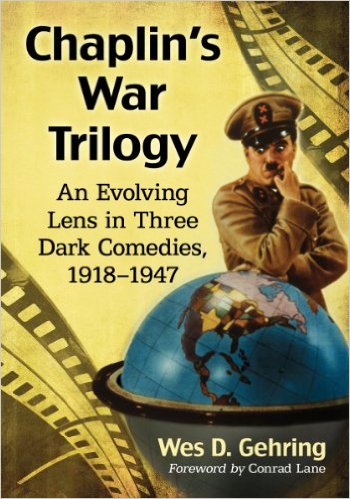
Chaplin’s War Trilogy
by Wes D. Gehring
McFarland & Company
Pop stars come and go, and Charlie Chaplin is now just a footnote in American film history. Born in England and raised on the stage, Chaplin signed with Mack Sennett in 1913 and furiously made movies for about 5 years. In that time he went from comic relief to a star; he wrote, directed, acted and became fabulously wealthy. After 1923 his output slowed down but the results were more complex, more thoughtful, and for the most part, more profitable. Author Gerhing digs deeply into Chaplin’s oeuvre focusing on three landmark films that concern war, or at least an interpretation of war thought Gehring’s eyes. He begins with an analysis of Chaplin’s background, the zeitgeist of pre-war America, and then delves in to the films.
First we consider 1918’s Shoulder Arms. In this film Chaplin sticks close to his trademark character “Charlie”. He’s everyman, does what he is told, make the best of it, grins and bears it. In 46 minutes Chaplin thoroughly explores the absurdities of war. He allows Charlie to make the best of bullets, flooding, and Army drills. This story resonated with both troops in the field and the folks back home. Next we fast forward to 1940; now Germany was expanding viciously through Europe. Chaplin expands artistically with the more complex The Great Dictator; it’s his first sound picture and it draws on elements of Leni Riefenstahl’s Triumph of the Will. This was a risky film parodying Hitler before the extent of his atrocities were known. The risk was not so much from Hitler although Hitler despised the film and had as many copies destroyed as possible. Rather, the risk lay in geopolitics. Chaplin had a high profile and there was still a hope a peace could be negotiated; would he damage the ineffective diplomacy of the day? There was an artistic risk as well; this was not the heart-touching comedy he was known for; but a darker comedy that contrasted his Tramp Charlie as the Jewish barber with the dictator “Adenoid Hynkel”. The movie ends with an open plea for peace; telling people how to think is not funny.
The last film explored is 1947’s Monsieur Verdoux. Here the connection to war is tenuous at best, this 1947 thriller is less about war itself than the brutality of man. Verdoux insinuates himself with older women, kills them and takes their money. Based on a true story, it was not well received, and after it Chaplin’s career and success faded until his death in 1977.
The book is worth reading for its insights in to Chaplin’s style, his approach to film making and the tension between public opinion and film maker’s artistic choice. Both influence each other, and Gehring does excellent work at capture the tension. The book is dense; it reads like a doctoral thesis in film studies with its extensive foot notes, bibliography and need to carefully argue each point to shut out any unexpected academic attacks. While I was familiar with Dictator, I’ve picked up the other two films and plan to explore them in the near future. Chaplin may no longer be on everyone’s lips but he is a significant force in what we expect from film and how we interpret it to this day. If this book can’t make you a film buff, then there is no hope. But here’s a takeaway: no matter how good a film is, war continues.












